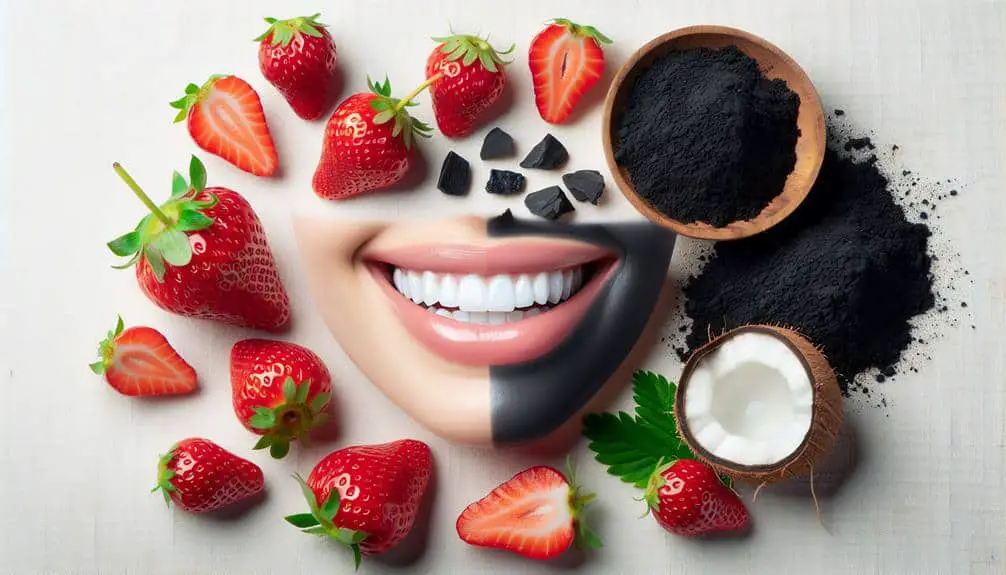Enhance your laser teeth whitening success with natural ingredients like aloe vera gel, which boosts whitening results and fights bacteria. Coconut oil offers whitening effects, combats bacteria, and freshens breath. Activated charcoal removes stains and balances mouth pH but should be used with caution. Baking soda is a cost-effective option that gently scrubs stains and freshens breath without harming enamel. Peppermint oil fights bacteria, reduces plaque, and guarantees a brighter smile. Discover more about how these natural powerhouses can optimize your teeth whitening results.
Key Points
- Aloe Vera Gel enhances whitening results and fights bacteria for healthier gums.
- Coconut Oil aids whitening, freshens breath, and improves oral hygiene.
- Activated Charcoal removes stains, balances pH, but use cautiously to protect enamel.
- Baking Soda gently scrubs stains, neutralizes acids, and protects enamel.
- Peppermint Oil combats bacteria, reduces plaque, and freshens breath for a brighter smile.
Aloe Vera Gel
To enhance your teeth whitening results, consider applying aloe vera gel as a natural and soothing option. Aloe vera has been used for centuries for its medicinal properties, and its benefits extend beyond just skincare. When it comes to oral health, aloe vera can be a game-changer. Its antibacterial properties help combat harmful bacteria in the mouth, reducing plaque buildup and the risk of cavities. Additionally, aloe vera gel contains vitamins and minerals that promote healthy gums and overall oral hygiene.
In terms of skin benefits, aloe vera is renowned for its soothing and healing properties. When applied to the gums during teeth whitening treatments, aloe vera can help reduce any irritation or sensitivity that may occur. Its anti-inflammatory effects can also aid in healing any minor cuts or abrasions in the mouth. By incorporating aloe vera gel into your teeth whitening routine, you not only enhance the whitening process but also promote better oral health and provide a soothing experience for your gums.
Coconut Oil
Consider incorporating coconut oil into your teeth whitening routine for its natural benefits and potential whitening effects. Coconut oil is a versatile natural ingredient that offers various advantages for oral health. One popular use of coconut oil is oil pulling, a traditional method that involves swishing oil around in your mouth to remove bacteria and promote healthier gums. The antimicrobial properties of coconut oil can help reduce plaque build-up and combat harmful bacteria in the mouth, contributing to fresher breath and improved oral hygiene.
Additionally, coconut oil can be utilized in DIY whitening toothpaste recipes. By mixing coconut oil with baking soda and a few drops of essential oils like peppermint or tea tree oil, you can create a gentle and effective whitening paste. The abrasive nature of baking soda helps scrub away surface stains on teeth, while coconut oil's antibacterial qualities promote a cleaner mouth environment. This natural whitening toothpaste can be a cost-effective and safe alternative to commercial teeth whitening products.
Activated Charcoal
Activated charcoal is a popular natural ingredient known for its potential teeth whitening properties and ability to remove stains from the surface of teeth. When used in toothpaste, activated charcoal offers several benefits for teeth whitening. Charcoal toothpaste benefits include its ability to bind to compounds that cause stains on the teeth, thereby helping to eliminate them. It's believed that activated charcoal can also balance the pH levels in the mouth, which may contribute to a healthier oral environment.
The charcoal teeth whitening process typically involves brushing with a charcoal toothpaste or applying activated charcoal powder directly to the teeth. The activated charcoal works by adsorbing surface stains and plaque, resulting in a brighter smile over time. While activated charcoal can be effective in removing surface stains, it's essential to use it cautiously to prevent enamel erosion. It's recommended to consult with a dental professional before incorporating activated charcoal into your oral care routine to make sure it's appropriate for your teeth.
Baking Soda
Using baking soda as a natural teeth whitening remedy has been a time-tested and cost-effective method for achieving a brighter smile. Baking soda, or sodium bicarbonate, is known for its ability to gently scrub away surface stains on teeth, leading to a whiter appearance. Here are some key points to keep in mind when using baking soda for teeth whitening:
- pH balance: Baking soda helps neutralize acids in the mouth that can erode enamel and lead to discoloration, promoting a healthier pH balance.
- Enamel protection: While baking soda is abrasive, it's milder compared to other whitening products, making it a safer option for protecting the enamel while removing stains.
- Stain removal: The mild abrasiveness of baking soda allows it to effectively remove surface stains without causing significant damage to the enamel.
- Fresh breath: Baking soda can also help freshen breath by neutralizing odors and killing bacteria in the mouth.
Incorporating baking soda into your oral care routine can be a simple yet effective way to enhance the brightness of your smile while maintaining good oral health.
Peppermint Oil
Peppermint oil, known for its invigorating aroma and potential oral health benefits, is a natural ingredient that can be utilized in teeth whitening practices. When it comes to oral hygiene, peppermint oil stands out for its antibacterial properties that can help combat harmful bacteria in the mouth. Additionally, its minty freshness provides a pleasant flavor and leaves a clean sensation after use.
Incorporating peppermint oil into your teeth whitening routine can enhance the overall experience. Its antibacterial properties not only contribute to a healthier mouth but also assist in reducing plaque buildup, which can aid in achieving a brighter smile. The minty freshness of peppermint oil can also help combat bad breath, giving you added confidence in your daily interactions.
To harness the benefits of peppermint oil for teeth whitening, consider adding a drop to your toothpaste before brushing or using it as a mouth rinse by mixing a few drops with water. By integrating this natural ingredient into your routine, you can boost both your oral health and the whitening effects on your teeth.
Frequently Asked Questions
Are There Any Potential Side Effects or Risks Associated With Using These Natural Ingredients for Laser Teeth Whitening?
When utilizing natural ingredients for laser teeth whitening, potential risks include allergic reactions or tooth sensitivity. To guarantee safety, conduct a patch test first and adhere to recommended guidelines. Benefits may outweigh risks, but precautions are necessary.
How Long Does It Typically Take to See Noticeable Results When Using These Natural Ingredients for Laser Teeth Whitening?
To see noticeable results when using natural ingredients for laser teeth whitening, it typically takes a few sessions. Speedy results vary based on individual factors but visible changes are often expected within 2-3 sessions.
Can These Natural Ingredients Be Used in Combination With Professional Teeth Whitening Treatments?
Yes, natural alternatives like DIY methods can complement professional teeth whitening treatments. Ingredient compatibility is essential for maximizing results. Incorporating these natural ingredients can enhance the effectiveness of professional procedures, providing a holistic approach to teeth whitening.
Are There Any Specific Brands or Products That Are Recommended for Each of These Natural Ingredients?
Seek out reputable brands like OrganicSmile for natural ingredient sourcing. Their products are known for effectiveness. You may also explore PlantBright for natural alternatives. These brands prioritize quality for your teeth whitening needs.
Are There Any Dietary or Lifestyle Changes That Can Enhance the Effectiveness of These Natural Ingredients for Laser Teeth Whitening?
To enhance the effectiveness of natural ingredients for laser teeth whitening, consider dietary changes like reducing sugary foods and incorporating more fruits and vegetables. Lifestyle modifications such as quitting smoking and maintaining good oral hygiene can also help achieve better results.



